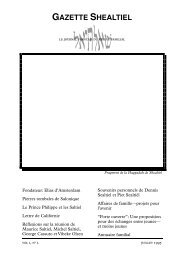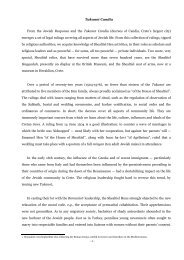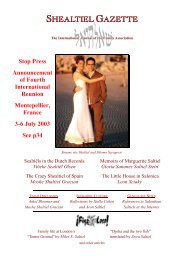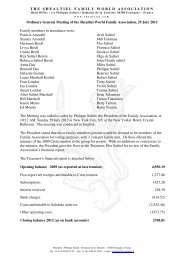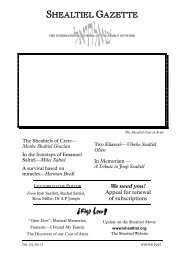Gazette Vol 1 No 4 - The Shealtiel Family Worldwide
Gazette Vol 1 No 4 - The Shealtiel Family Worldwide
Gazette Vol 1 No 4 - The Shealtiel Family Worldwide
You also want an ePaper? Increase the reach of your titles
YUMPU automatically turns print PDFs into web optimized ePapers that Google loves.
december 1995 SHEALTIEL GAZETTE vol i no iv<br />
HISTORY<br />
<strong>The</strong> Biblical <strong>Shealtiel</strong><br />
To flesh out the background to Vibeke Olsen’s article in our last issue speculating<br />
about the descent from David, Alex Schattil of Sydney, Australia sets out the<br />
Biblical account of the original bearer of the name and his descendants.<br />
A telephone call late one night was to set<br />
me on a search through the Bible and other<br />
historical books, to unravel the origin of my<br />
family name, Schattil. <strong>The</strong> call came from a<br />
niece in London who was terribly excited<br />
about our possible descent from the Biblical<br />
<strong>Shealtiel</strong> of the House of David. She was sending<br />
me an article from the Chicago Tribune of 4,<br />
September 1994, about a reception in Amsterdam<br />
of some people who all had names similar<br />
to <strong>Shealtiel</strong>, such as Saltiel, Sealtiel, Chaltiel<br />
and Scheatiel. <strong>The</strong>y came from widely scattered<br />
countries in Europe, the Middle East and<br />
the Americas. <strong>The</strong>y also spoke in many languages<br />
such as English, German, Dutch,<br />
French, Spanish, Greek, Hebrew, Arabic, Turkish,<br />
Flemish and Ladino, which is spoken by<br />
the Sephardic Jews of Southern Europe in<br />
much the same way as Yiddish is spoken by<br />
Ashkenazi communities in Eastern Europe.<br />
It is thought that the family name came from<br />
the <strong>Shealtiel</strong>, son of the last king of the House<br />
of David, who was taken into captivity by the<br />
Babylonian invaders who conquered Jerusalem<br />
and later destroyed the Temple. However, in<br />
more modern times, the name <strong>Shealtiel</strong> was<br />
borne by Sephardic Jews who fled from Spain<br />
in 1492 at the time of the Spanish Inquisition,<br />
and was taken by them to Holland, Germany<br />
and the Ottoman Empire.<br />
My niece asked whether I thought we<br />
could also be descended from <strong>Shealtiel</strong> of the<br />
House of David. I replied that I did not know,<br />
that I had never heard of any tradition in our<br />
family of any connection with the Biblical<br />
<strong>Shealtiel</strong>. My first reaction was: who was<br />
<strong>Shealtiel</strong> and when did he live? Apart from the<br />
newspaper article, I did not remember seeing<br />
his name anywhere, so I began to study the<br />
Bible in search of this character. As he was<br />
stated to be a descendent of King David, I began<br />
my search in I Samuel, 16, which relates<br />
the story of King David, but it soon became<br />
apparent that he lived at a much later time,<br />
and that I would have to search elsewhere. I<br />
approached Rabbi Cohen for assistance, and<br />
he referred me to the book of Ezra, where, in<br />
3:2, I read that Zerubbabel was the son of<br />
<strong>Shealtiel</strong>.<br />
”<br />
<strong>The</strong>reafter, I found numerous references<br />
to Zerubbabel and his father, <strong>Shealtiel</strong>. It soon<br />
became obvious that he lived in turbulent<br />
times, and the Encyclopaedia Judaica reveals<br />
that he was the first or second son of King Jehoiachin<br />
who was exiled from Judah at the age<br />
of eighteen in 597 BCE. He came to the throne<br />
on the death of his father, Jehoiachin, who was<br />
a vassal of King Nebuchadnezzar of Babylon.<br />
He rebelled against the Babylonians after three<br />
years (II Kings, 24:16), and he appears to<br />
have met a violent death probably as a result of<br />
a palace revolt, since his body was thrown outside<br />
the gates of Jerusalem and left to die there<br />
like the carcass of an ass (Jeremiah 22: 1819,<br />
36:30).<br />
After a reign of three months, Jehoiachin<br />
must have decided that there was no future in<br />
resisting the mighty army of King Nebuchadnezzar,<br />
and in company with his mother,<br />
Neaustha, his wives, nobles, officers and servants,<br />
he surrendered to the Babylonians who<br />
took him into captivity to Babylon. With him<br />
went all the treasures of the Temple and the<br />
King’s house (II Kings, 24:815). He was succeeded<br />
as King of Judah by his uncle, Mattaniah,<br />
who changed his name to Zedekiah (II<br />
Kings, 24:17). He rebelled against Nebuchadnezzar,<br />
and after a long siege, he fled from Jerusalem<br />
and was captured on the plains of<br />
Jericho. <strong>The</strong> Babylonians executed his sons before<br />
his eyes, blinded him, bound him with fet<br />
page three




